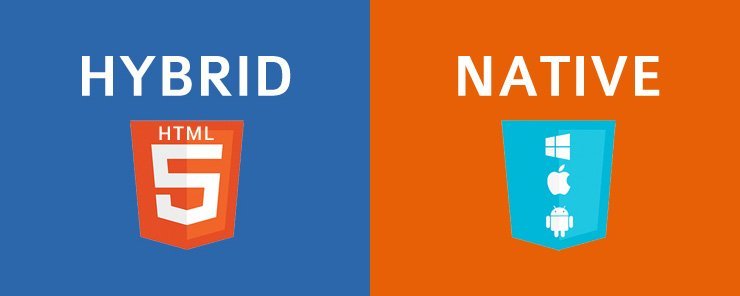
The one doubt which frequently pops in the current development scenario is whether one should create a native mobile app or a hybrid app. If you are a developer, you need to devote time to carefully examine all the intricacies of both the platforms before deciding on one.
Since the platform you will be using will directly affect the final product. To make the process easier for you, we have compared both these platforms to guide you in making the right decision.
What are Native Apps?
Native apps are designed to work on a particular mobile environment. They won’t work on different mobile OS. For instance, if you were planning to build a native application for iOS you would create it in the Swift.
A big benefit of using native apps is that they are perfectly capable of performing all the functions of the determined device easily and if the apps are developed well they are going to operate error free on the device.
Most of the companies initially build their app for an individual operating system when they build it using a native app. If the app turns out to be successful for that particular mobile os, then you can proceed to spend time and money and build it for other operating systems too.
What are Hybrid Apps?
Hybrid apps are those which are built to run on various operating systems. It is designed using a particular standard coding language ( for e.g. Javascript, CSS and HTML) and later arranged to run on different platforms.
Distinct interactions related to different devices are often achieved through the application of plugins for each operating system.
An important benefit of using a hybrid app is that it allows the app to run on various OSes without burning a hole in your pocket. If the development of an app is executed properly, users would be incapable of differentiating whether the app is built using the hybrid or native route.
Comparison of native and hybrid apps
1. Platform Autonomy
Hybrid apps can easily operate on all leading operating platforms contrary to native apps which operate on a single specific platform only. If your objective is to cater to a number of platforms to gain more consumers, choose hybrid app development as it offers more platform autonomy.
2. Cost
Making hybrid mobile apps is budget friendly as opposed to the development of a native mobile app. Native mobile app development demands specific expertise in Java, whereas hybrid mobile app development demands sound knowledge and specialisation in HTML5.
3. Support
Supporting and maintaining a native app often comes across as a challenging job not just for the business but for the technical team too.
For instance, if you want to release the latest version of your native app, (Android) it requires you to submit the newest version of your native app (Android) on the Google Play Store.
On the other hand, sustaining a hybrid app (Android) is quite easy and you can frequently make changes to the hybrid app as you make in a regular webpage.
4. UI
If your aim is to deliver consumers with a steady user interface with the mobile os then native application development should be the favoured option.
Native application development renders better graphics and visuals because the native API’s possess the strength to have seamless animation. On the contrary, hybrid mobile apps use HTML5, CSS, etc which is slow in terms of delivering the graphics and visuals.
5. Development Timeline
Hybrid apps are simpler and quicker to design and put in use. But, if you have used a big number of native and complex peculiarities which are past the ability of the hybrid app development structure and environment, then the time consumed will be more to develop such type of hybrid apps.
6. Paid/Free
Considering native apps deliver an excellent user interface, therefore, paid applications are often encouraged to be built a using native app development framework while hybrid apps are usually built as free.
7. Offline Functioning
If you want your application to work even when there is no Internet connectivity, you can opt for native mobile app development. Native apps don’t necessarily require an Internet connection to operate, but in the case of hybrid mobile app development, you often need to have an Internet connection to utilize the functionalities of the hybrid mobile app.
8. Tools and Debugging
Native app development framework presents useful development conditions and tooling to run tests and debug the app, therefore, it is quite easy and consumes less time to search and remove the bugs through native development tools.
In case of hybrid app development, no such reliable tools exist which can resolve debugging as well as fixing problems and most of the times, developers end up spending several hours to fix any problem in the existing hybrid app development framework which could have been found and fixed in few minutes utilizing the native app framework tools.
From the detailed analysis of both app development frameworks, you can see that each of them carries their own advantages and disadvantages. Platform autonomy, development cost and timeline, UI/UX, etc make hybrid apps the preferred choice. But you can take the native route too as it extends great security, a steady user interface and these could be monetized too.
To make sure that you go with the right option, it is essential to know the future each of the framework has so that you are not left clueless about the upcoming significant changes in the app development scenario.


